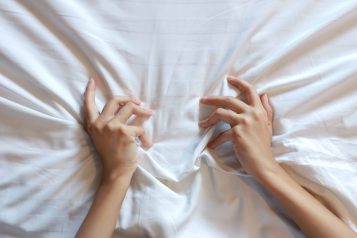Lana Mar is the owner and founder of the first Face Fitness Bar in Miami, the most unique concept of natural facelift that replaces fillers. Lana Mar is a skincare guru, educator, and certified celebrity esthetician. After a severe allergic reaction to Botox, which is not very common, she was inspired to create an effective alternative. As a former pro-athlete, Lana Mar believed in muscle memory and developed a Signature Hybrid massage with techniques from across the world in combination with cutting-edge technology and organic skin care to replace fillers and Botox. Since then, Face Fitness has become a movement with its shocking instant results, breaking the stereotype of plastics. Face Fitness was featured on Time Out Magazine, and featured on NBC6 for her celebrity-approved treatments, World Red Eye, and Voyage Miami.

Alcohol is everywhere! Dinner, brunch, wedding, birthday, anniversary, and sports games. It seems to be a regular part of our lives and the main stress reliever after a long day at work. It’s 5 o’clock somewhere; you say sipping on an ice-cold refreshing Aperol Spritz on a hot summer afternoon. Later in the evening, it’s a glass of bubbly before dinner and a choice of white or red. And we almost forgot dessert, which can’t be as good without chilled Limoncello. It’s very difficult, or should I say impossible, to avoid alcohol in modern social life. So what are the reasons to cut on alcohol, you would ask? Besides the fact that it gives you headaches, hangovers, and anxiety? Alcohol is in fact harmful to your skin health, making you not only look older but feel older. Here, Founder of Face Fit Bar, Lana Mar dives into the details regarding alcohol and skin and how to know if it is really affecting its health.
What are the major signs of alcohol affecting the skin?
Alcohol causes oxidative stress that damages DNA and can lead to premature aging. As a result, you may feel older due to alcohol and aging effects.
Does your face flush when you drink? Well, you may also have some degree of rosacea. Drinking alcohol can sometimes trigger a rosacea flare-up. Some people get hives. They are red, itchy skin bumps that might appear when you drink. Hives, are also known as alcohol intolerance when your body cannot break down alcohol well. It can also be a result of an allergic reaction. Extreme sun sensitivity can be developed. Your skin can itch, turn red, and can wound easily when in the sun. Bacterial and fungal infections are more likely to occur in heavy drinkers because alcohol weakens the immune system and can decrease the body’s ability to absorb nutrients.
Excessive drinking can develop psoriasis, a buildup of dry, itchy patches. Alcohol can also trigger seborrheic dermatitis, and it’s often a sign of immune system problems or yeast in the body. However, the most severe side effect of alcohol affecting the skin is cancer of the mouth, throat, voice box, and esophagus.
Why is alcohol bad for your skin’s health?
Alcohol is a diuretic, which causes the body to make and release more urine (losing more water and salt than usual). It removes the fluid in the skin, which can increase the appearance of wrinkles, dryness, decreased elasticity, sunken eyes, and dry lips. Flushing can be another side effect when alcohol stimulates the release of histamines and causes the blood vessels under the skin to dilate. Alcohol breaks up your normal sleep cycle and can make you tired throughout the night. That often leads to dark circles under your eyes. It dehydrates your body, which could make your eyes and the entire face puffy.
Besides dehydration, it can lead to pores congestion and acne. Drinking alcohol doesn’t cause acne directly, but it affects bodily systems, such as your hormone levels, that influence acne development. Alcohol can increase inflammation and suppress your immune system, leading to bacteria buildup.
 Photo Credit: Shutterstock
Photo Credit: Shutterstock
What type of alcohol is the most harmful to your skin?
Sugary alcoholic drinks are going to be the worst because of the increased effect on blood sugar levels. The ideal solution for acne-prone people is to stick to the clear liquor and avoid any sugar mixers. Stay away from dark spirits, as they are the worst culprits. Wondering why?
Dark spirits, like whiskey, brandy, and cognac, contain congeners (chemicals such as tannings and methanol, which are created in the fermentation process), and their alcohol content is much higher.
Red wine, which claims to be the healthiest, is the most damaging to the skin. Since red wine is unfiltered, our liver and kidney have to work twice harder to process it. Additionally, it contains tons of sugar, which leads to inflammation, increases cell damage, and is a cause of acne. White wine has a very high sugar content that leads to decreased levels of GAGs (Glycosaminoglycans – these support our cells’ proteins).
So what should we order for happy hour? Maybe a nice refreshing margarita with a salt rim? Apparently, a margarita is the worst drink you can order as it contains both sugar and salt, both of which can leave skin puffy.
Here it gets better for beer lovers. Beer contains a variety of compounds that have antioxidant benefits. In addition, it is light in alcohol and sugar and has the least effect on the skin. With the winner is, Clear Spirits (Vodka, Gin, Rum, Tequila)!
Gin, before becoming sprits was used as medicine for stomach aches. It is made of juniper berries and botanicals which are considered to be superfoods. Can improve gut health, blood circulation to the face, and almost never a hangover. Vodka and tequila are associated with disinfecting the skin and killing acne-causing bacteria.
How often do you need to drink for the alcohol to affect your skin?
Let’s define healthy! Alcohol is considered low-risk and safe for overall health and skin if you stay within recommended daily and weekly limits. Experts recommend for females – 1 drink per day, males up to 2 drinks. The National Institute of Alcohol Abuse and Alcoholism defines heavy drinking as follows: Female -more than 3 drinks per mayor more than 7 drinks per week. Male – 4 drinks per day or more than 14 per week.
For more information, visit Dr. Brian A. Levine's social media:

























